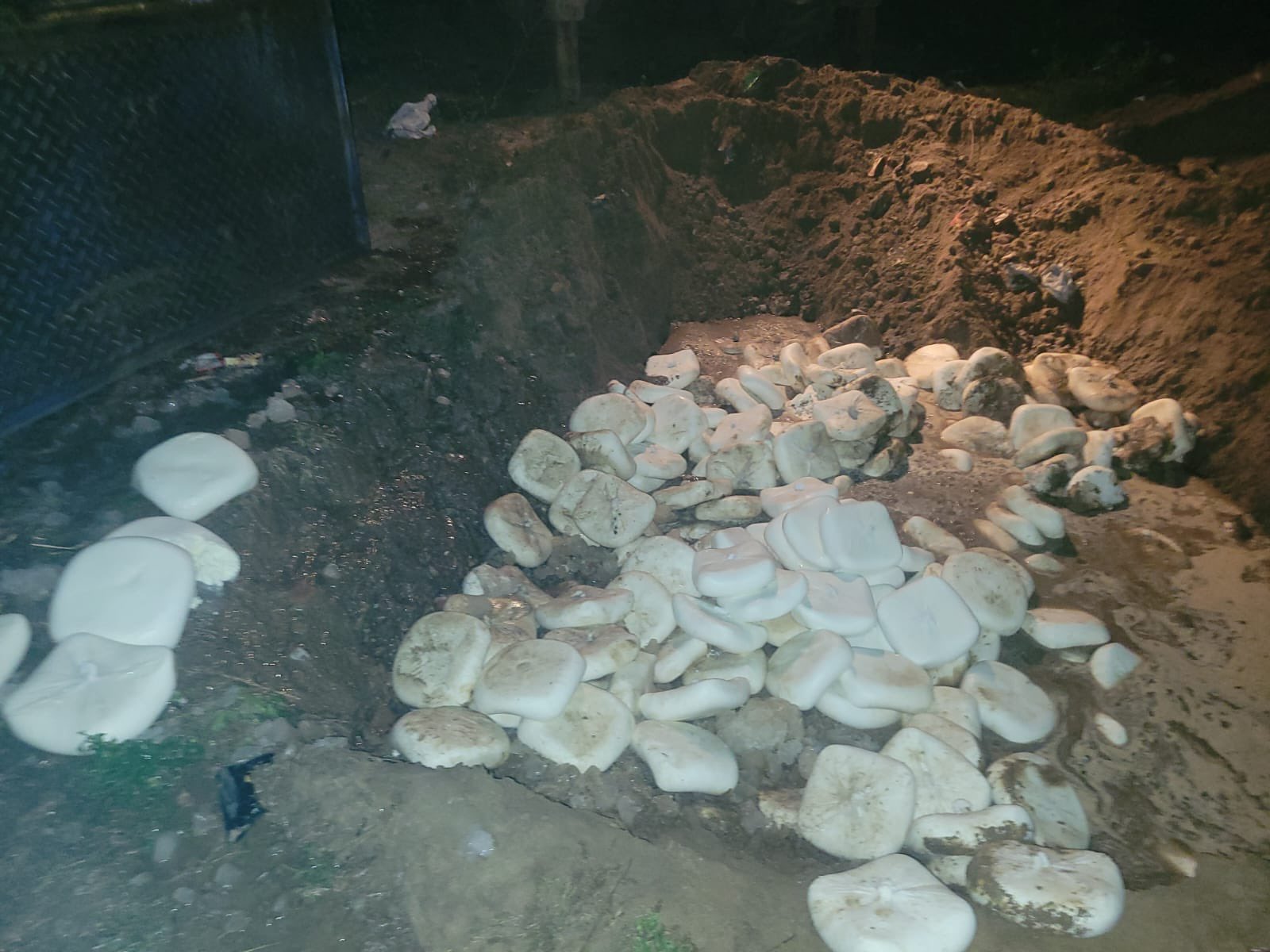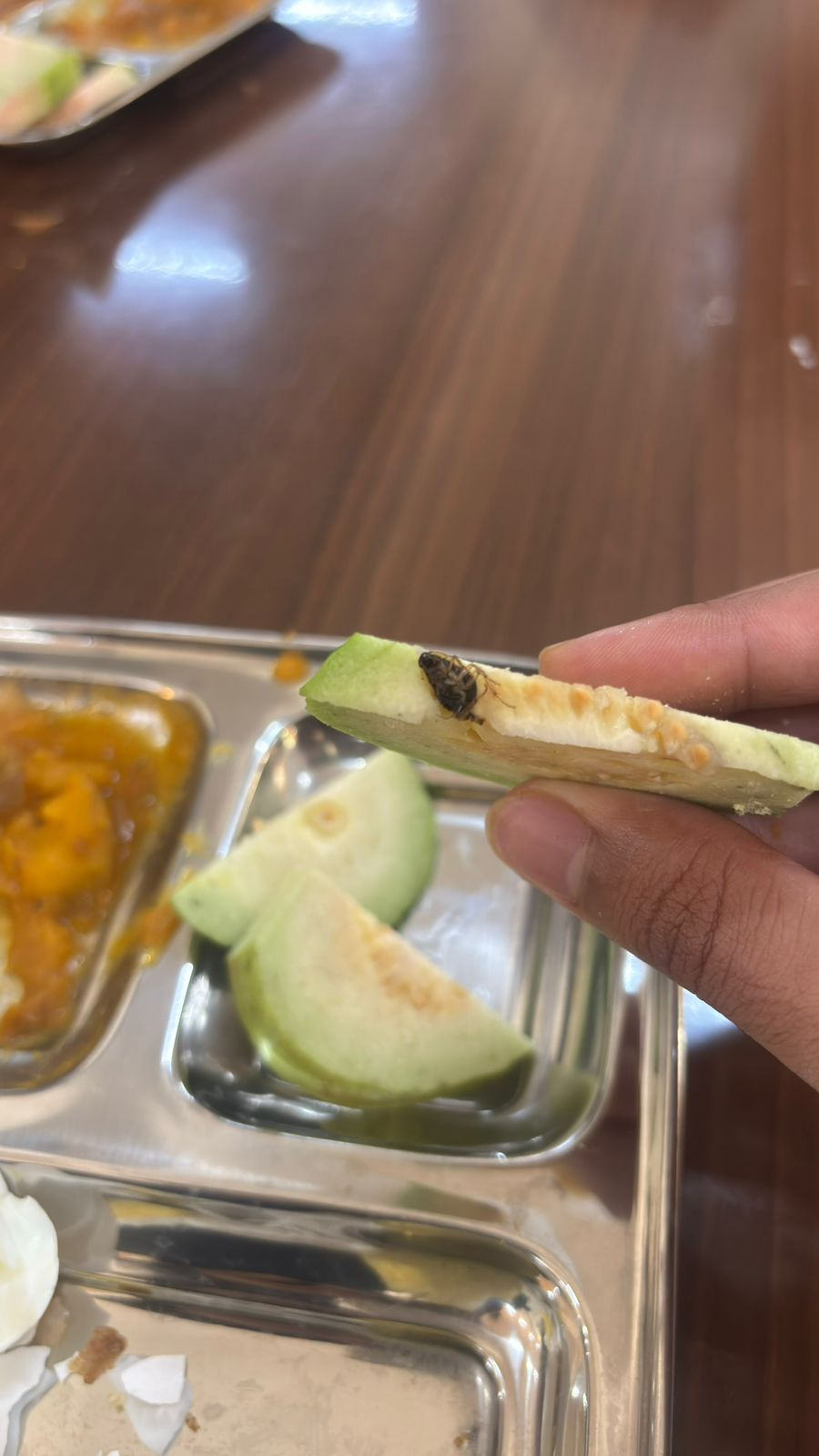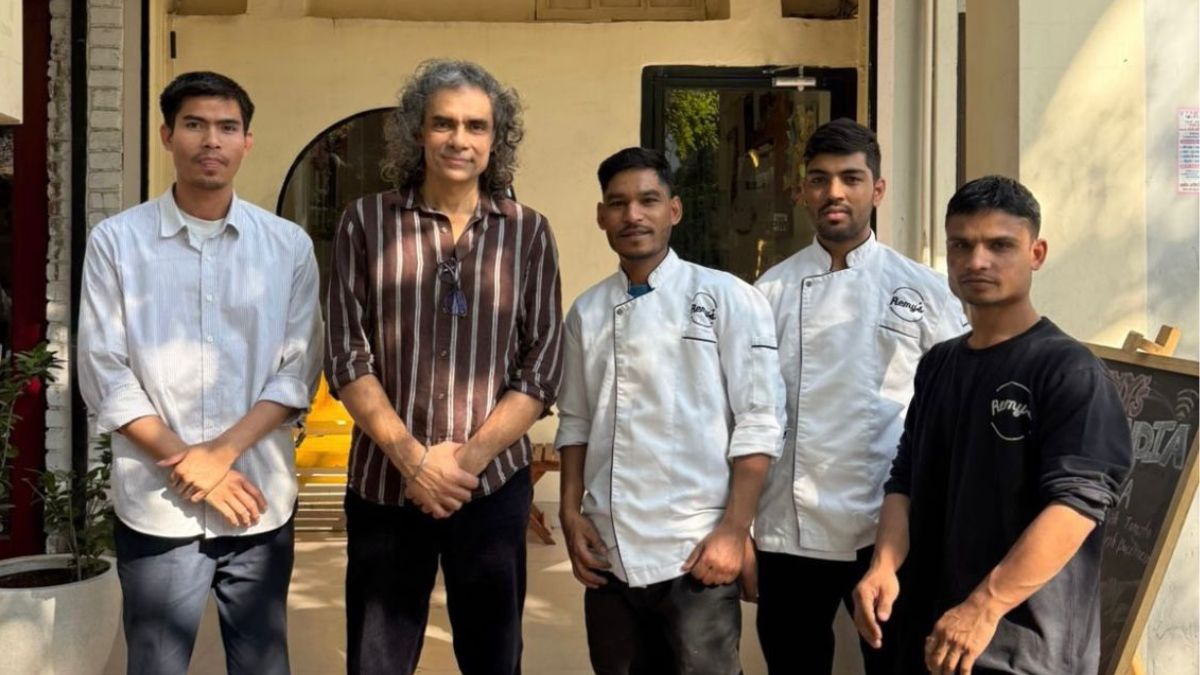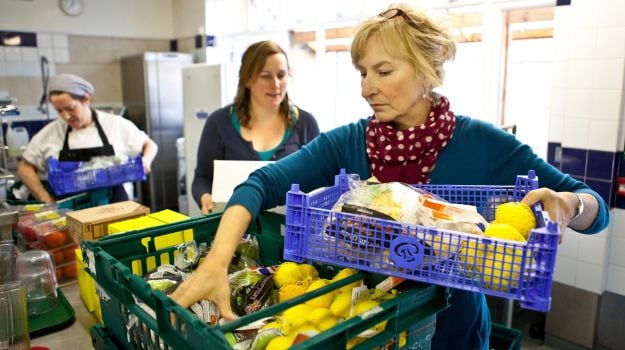FareShare volunteers deliver food to charities around London. Photograph: Antonio Olmos for the ObserverAcross the globe, initiatives such as food-sharing clubs and projects aimed to reducing post-harvest losses for poor farmers are making a difference.
UK
A group of volunteers stand in the FareShare depot in Deptford, south-east London, as shift coordinator James Souteriou calls out items. They are putting together grocery orders to be delivered to organisations across London " to a branch of the homelessness charity Thames Reach, to the Holborn Community Association and a local nursery and infants' school.
"Can I get a tray of pineapples? A tray of chicken madras? Three boxes of porridge?" James calls and the volunteers scurry off in their hi-vis vests and steel-capped boots to fetch the items from towering piles of food.
The quantity of food in the depot is overwhelming. In the centre of one of the aisles is a delivery from a supermarket of about 500 jars of pasta sauce. Boxes of rice are stacked on shelves to the roof and the walk-in dairy fridge is so full that somewhere else has to be found to store excess yoghurt.
The volunteers collect trays of pork sausages, potatoes, stir fry sauces, bread, watermelon, eggs, chicken, apples, cereal and fruit juice. All of the food looks appetising and is within its best-before date. But if it weren't for FareShare, all of it would have been thrown away.
FareShare has been running as an independent charity since 2004. It collects food from supermarkets, cafe chains, bakeries and other retailers that would otherwise be discarded and distributes it to 2,020 charities across the country. Last year it redistributed 7,360 tonnes of food, providing 15.3m meals and saving the British voluntary sector an estimated "£19m.
One of the charities that receives weekly deliveries from FareShare is the Deptford Methodist Mission Disabled People's Contact (DPC), which provides three-course lunches for elderly people in the area three days a week.
Since the DPC began receiving FareShare deliveries in February 2014 it has cut its food bill by 30%, meaning it can direct funds elsewhere, such as a much-needed new minibus for which the centre is currently fundraising.
"It's the best thing that's ever happened to us. We get such good stuff, things we'd never be able to afford," says Lisa Helsby, the volunteer coordinator at the DPC.
"One day we got salmon and mangoes," says Erica Ross, day centre manager, "and it just happened to be the day the mayor was visiting, so we thought, oh aren't we fancy? But then we also wanted to let the mayor know, we don't always eat like this! It's not all salmon!"
Salmon or not, the people who attend the centre are not complaining about the food. DPC regular Pat's favourite is the pork pot roast with the trimmings. "The roast is unbelievable. It's very good," she says.
For Pat, 73, the appeal of the DPC is the social connection. "You get lonely and sometimes when it's just you at home you don't make a proper meal." She has been coming for seven years, for lunches on Tuesdays and Wednesdays, and is devastated when she has to miss it. "It shuts down for two weeks at Christmas and two weeks over summer, and we all can't wait to get back."
FareShare has begun to change attitudes to food waste in the UK retail sector, but Mark Varney, head of FareShare's food department, says there is a long way to go.
"Last year we collected 7,300 tonnes, but our French sister organisation redistributes 100,000 tonnes a year. In Portugal it's even higher than that per head of the population. It's high in Germany, Belgium, Holland, Italy. So the UK is by far the smallest," he says.
Organisations in other European countries are helped by funding from the EU to buy warehouses and trucks, as well as national tax systems that allow supermarkets to claim rebates on produce given to FareShare-type organisations, whereas the UK has neither of these incentives.
FareShare also finds itself competing against alternative and much cheaper methods for supermarkets to deal with excess food: selling it to be used for anaerobic digestion, which turns food into electricity, and animal feed, both of which Varney says are "great for food that actually is waste" " such as banana skins or apple cores " but not the ideal solution for food that is still edible.
"The management time involved and costs of logistics in keeping food as food are higher than they would be if I were treating it as waste. We're constantly fighting against that," he says.
Varney remains optimistic and ambitious. "Our goal is to increase the amount of food collected to 100,000 tonnes by the end of this parliament," he says.
Kate Lyons
China

Zhang Qinyu was born and raised in Shaanxi province, China's biggest fruit-producing region. His hometown, Xianyang, is the country's apple capital.
Growing up in Shaanxi, Zhang, 23, witnessed not just an abundance of fruit and vegetables but also the scandalous waste of produce that was allowed to rot before it could be sold because of poor storage facilities.
Food waste is a severe problem in China. Last year Xinhua, China's official news agency, reported that $32bn worth of food " enough to feed 200 million people " was lost each year.
Vegetable and fruit wastage in China, Japan and South Korea has been identified by the Food and Agriculture Organisation of the United Nations (FAO) as a key area to be tackled. It estimates that almost 40% of all fruit and vegetables produced in these countries are wasted. Between them, China, Japan and South Korea produce more than 50% of the world's vegetables and so this wastage equals a very large quantity of food.
After graduating last year Zhang looked to the internet for a fix, and set up Shaanxi Yihong Agricultural Technology Company, an online firm that helps connect rural farmers with hungry consumers in urban China.
"I realised e-commerce could provide a solution to their problem. E-commerce links the farmers to customers, bypassing wholesale buyers, making it easier for farmers to sell their fruit and vegetables so less goes to waste," he says. Through Weibo, China's answer to Twitter, Zhang has helped farmers shift produce including spring onions, pears, apples, dates and kiwis.
Part of the country's problem is that many farmers lack the technology to adequately store their produce, he says. "Many are using cellars rather than proper cold storage units." Another major issue is that small-scale farmers " hoping for the highest possible price " often wait too long before offloading their crops.
Earlier this year Zhang used the internet to help farmers in Qian county, Shaanxi, find buyers for 3,000 tonnes of pears that would otherwise have spoiled. "When the farmers harvested the pears last October, they didn't know the latest market price and thought the price offered to them was too low," says Zhang. Rather than selling, they put the pears into cellars, hoping that the price would rise during the Chinese new year, but in fact nearly lost everything.
He placed an advert on Weibo reading: "I have checked the pears myself and they are big, juicy and sweet." It worked. The fruit found buyers before it rotted.
"If we had not stepped in, those pears would have gone bad and the farmers' hard work would have been wasted," says Zhang.
Tom Phillips in Beijing; additional reporting by Luna Lin
Uganda

Hasifa Nakaziba, a mother of seven, has relied on farming maize and beans to support her family for years. But each year she would lose 30% of her harvest as pests infested her grain, taking their share of the food before it reached the dinner table
"From nowhere rats, chickens and insects would come and eat it," said Nakaziba, who lives in Nambale village, about 85 miles east of the capital, Kampala.
Like many farmers, Nakaziba, 47, lacked proper drying facilities for the grain and so would dry it on the ground before storage, unaware that this could lead to deadly aflatoxin contamination.
Her inability to safely store her harvest also forced her to sell her grain early, which meant Nakaziba received a very low price from the local market.
"It affected our income, food security and also the education of our children," she says.
Then in 2014 Nakaziba's life changed. She received training in post-harvest handling from the UN's World Food Programme (WFP), which launched an operation designed to reduce post-harvest food losses for 16,600 low-income farmers in Uganda by providing them with simple storage facilities, such as silos, granaries and grain storage bags. In a workshop Nakaziba learned how to improve her farm management practices and purchase new technology storage and handling equipment.
Today a huge airtight silo, allowing Nakaziba to safely store more than 500kg of grain for as long as she desires, for family consumption or sale, sits in a corner of her modest home.
"If the market price is favourable, the farmer can choose to sell, but they are now no longer forced to sell immediately following harvest to avoid losses," explains WFP's Uganda programme officer, Richard Sewava.
Nakaziba, who purchased the silo and a plastic tarpaulin from the WFP on a cost-sharing basis, is happy. "Now the rats cannot get to my grain, and by selling later I am able to get 900 shillings [16p] per kilogram instead of 350," she says. "With the extra money I'm getting I can buy things for my children and my garden."
The programme has been hugely successful in Uganda, where about 95% of food losses occur in the post-harvest, production, and distribution stages and only 5% is wasted by consumers. Ninety-eight per cent of farmers who participated in the programme said it helped them reduce crop losses to below 2% of their harvest, and the majority of participants doubled their average selling price in each major crop. The ability to lock the storage silos proved particularly helpful for female farmers, who are more vulnerable to their crops being stolen, with more than 98% reporting a significant increase in household food security.
The project is being expanded this year to reach more than 42,000 low-income farming families in Uganda.
"Given the wonderful success we are witnessing in Uganda, there is a high level of interest now being shown by neighbouring countries Rwanda, South Sudan, Kenya and Tanzania for similar implementation support,"says the WFP project leader Simon Costa.
Amy Fallon in Kampala
Germany

Margarete Herrmann has popped out of her psychotherapy practice in the leafy Berlin suburb of Zehlendorf and cycled to the nearby organic store, Bio Company, for a twice-weekly pickup appointment. A salesperson greets her at the shop and hands over five boxes full of food. Carrots, cream, yoghurts, beansprouts, tofu burgers and bread rolls are among the items inside.
Herrmann is one of about 8,000 "food-savers" across Germany, Switzerland and Austria who combat food waste through the growing online platform Foodsharing.
Herrmann carefully sorts through the food, deciding what she will keep and what she'll give to others in her neighbourhood, or sometimes just strangers on the street.
She is joined by Raphael Fellmer, the founder of Food Rescue, which merged with Foodsharing at the end of 2014. His food-saving life began as a "dumpster diver", sorting through the bins of food stores and picking out good food that had been thrown away. "But I wanted to find a more socially acceptable way of saving food, rather than risk being caught by the police with my head in a bin," he says.
In the three years since Foodsharing began, Herrmann, Fellmer and the growing army of food-savers have carried out 150,000 pickups from 1,600 shops and saved almost 2,000 tonnes of food from supermarkets, restaurants and bakeries that otherwise would have been thrown away.
Fellmer, 31, proudly points to the bins at the back of the store to show how much the waste has been reduced since Foodsharing began. "When we started they had three times as many bins," he says.
The food savers take the food to communal shelves and fridges " of which there are now about 300 " known as Fair Teiler (a play on verteiler, the German word for distributor) . The highest concentration is in Berlin, which boasts 19 of them.
Sarah, a student, takes a detour to one in the hip eastern district of Prenzlauer Berg, on her way home from university. Accompanied by her golden retriever puppy she heads into the graffitied inner courtyard of a 19th-century house on Dunckerstrasse, and peruses the shelves of a gaudy orange fridge .
"What have we got today then?" she asks, before retrieiving two bread rolls, some carrots, a wilting parsnip and some rocket salad. "That should do me for my supper," the 25-year-old says. "And two things that really cheer me: I've rescued the food, and it's free."
As she leaves, Nora, a physiotherapist, cycles into the courtyard to fill the shelves with low-fat milk and ripe bananas she has just picked up from a local shop. "The best thing about this is how it raises the awareness about waste," she says.
That the system functions has much to do with the goodwill of volunteers such as G"érard Roscoe Misler, who ensures the fridge is clean and the food inside is still fresh enough to eat. The 53-year-old countertenor and urban gardener, who also runs a community shop at the front of the house, painted the fridge orange, and ensures it stands on a wooden table to stop rats getting inside.
He says the distribution point has become increasingly important the more gentrified Prenzlauer Berg has become. "There are lots of people here who don't have much money and who find it a lifesaver to be able to get some milk or bread," he says.
Buoyed by its tremendous popularity and by the many requests received to set up similar online platforms across the globe, Foodsharing's creators are due to send the website's template out into the world by the end of the year, when it will go fully open source in the hope of sparking an anti-waste initiative on a global scale.
Kate Connolly in Berlin












